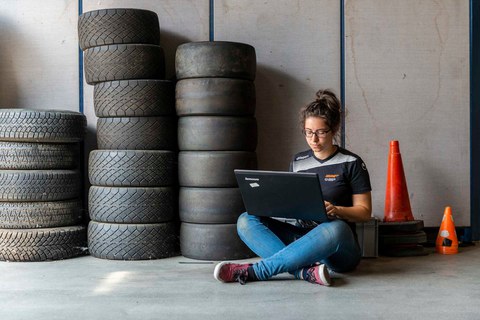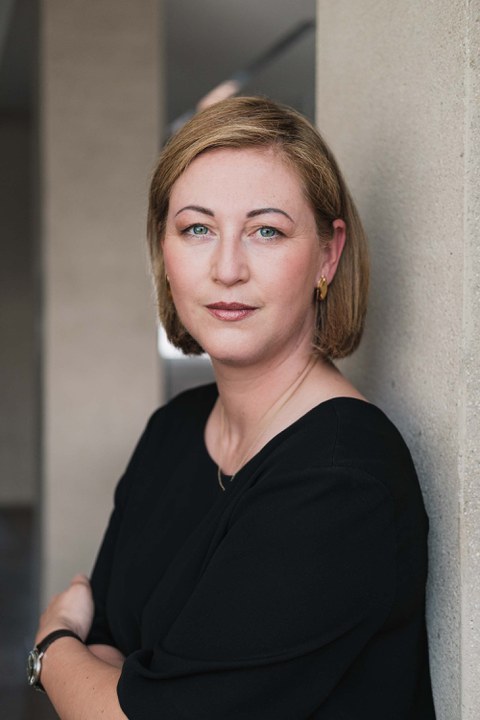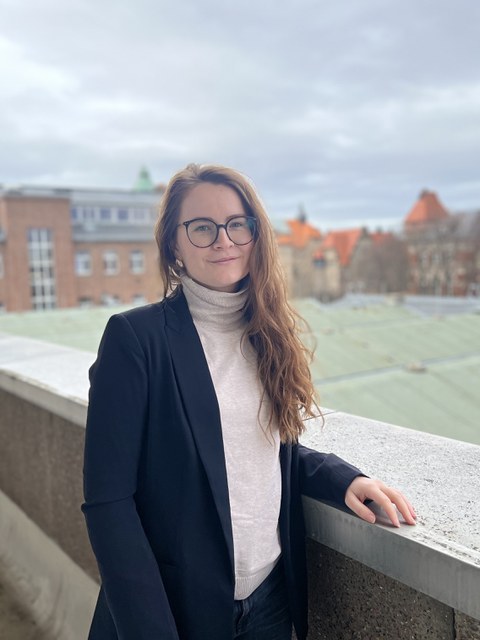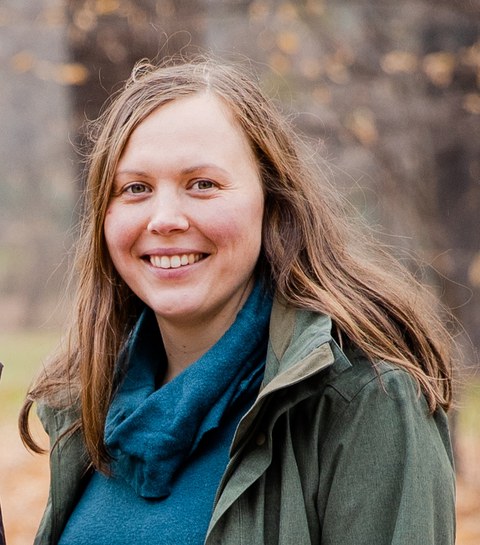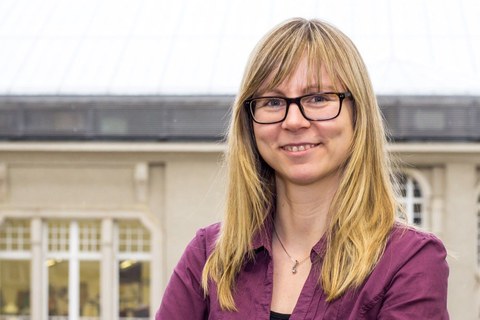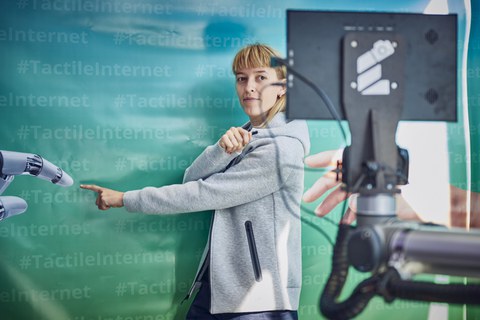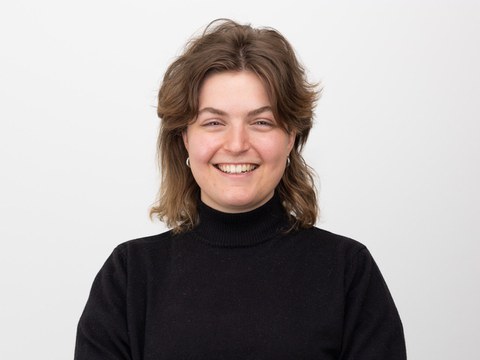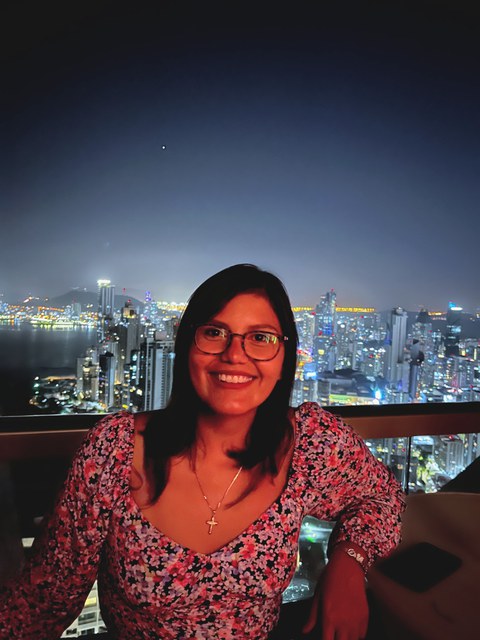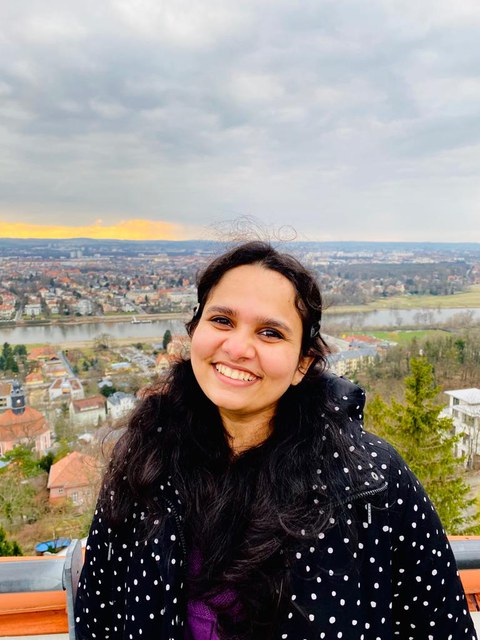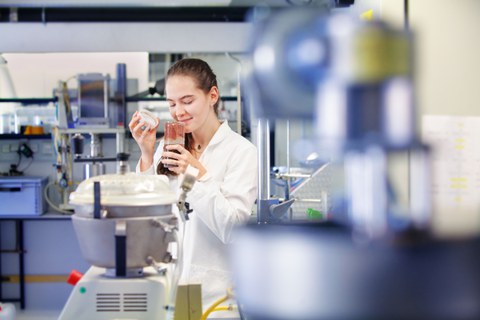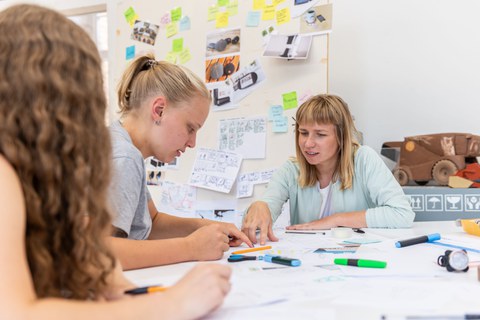ENG-Portraits
The decision to study is an important decision for one's own future. Women are often still underrepresented in STEM subjects in particular. TUD therefore aims to inform young women about their study options and motivate them to take up a technical or scientific degree at TUD. Making female role models visible and providing information about future course content as well as practical experience and knowledge about possible areas of application of STEM subjects in "real life" is an important component of this. On this page, we would like to introduce you to interesting STEM women in the form of short portraits.
Can you tell us about your academic background and your research work in engineering?
I studied my greatest passion - desining - and have always been particularly interested in design at the interfaces of technology and society. I research and teach at the interface of design, innovation and social transformation. My focus is on co-creative, systemic and design-oriented innovation processes - often in close collaboration with engineers, architects, urban designers, landscape architects and civil society stakeholders. People are always at the center of everything I do. I am not an engineer in the traditional sense - my perspective is shaped by design and transformation science. After working in the automotive industry and international cooperation, I took the step back to academia to contribute and research the opening towards inter- and transdisciplinary cooperation. However, through numerous inter- and transdisciplinary projects with engineers, architects and stakeholders from administration and society, I have experience in how technological, social and cultural perspectives on change can be productively brought together. The dialogical opening of such systems is a central concern of mine, which means leaving the academic ivory tower and involving new stakeholders.
What are your core research areas?
I research innovation processes that address not only technical, but also social, cultural and ecological dimensions. The central question is how we can use design-oriented methods - especially design and co-creation - to provide systemic support for social transformations. My approach is inter- and transdisciplinary and is located between design research, innovation management, sustainability science and transformation research. I am particularly interested in
- Participatory innovation - how stakeholders and citizens can be involved as co-creators
- Systemic design - to redesign complex contexts in administration, urban development and business
- Design as a leadership and governance tool - especially in public institutions and socio-spatial contexts
I don't see innovation as linear progress, but as the responsible shaping of possible futures - especially where social justice, planetary boundaries and collective learning intertwine.
What projects or research work have you carried out recently?
Before my time at the TUD, I designed an innovation lab for digital administrative modernization in a federal ministry with a focus on impact, participation and learning institutions, and before that I researched and worked on digital transformation in the automotive industry. As part of the deputy professorship at the Chair of Technical Design, I mainly introduced new team structures for collaboration, initiated new collaborations for the chair and taught courses. Now I am looking forward with great curiosity and anticipation to the International Interdisciplinary Autumn School, which I will be holding for the second time in Hoyerswerda, Lausitz at the end of the summer semester together with Prof. Nora Huxmann and Prof. Robert Knippschild - thanks to the generous FOSTER funding, we will be able to develop interdisciplinary projects on open space design for residents in Hoyerswerda within a week and present them to society with an exhibition on site. The focus here is on linking spatial planning, social innovation and design research in structurally weak regions.
What are your professional goals as a professor?
In terms of research, I would like to continue to think and act creatively at the interface between design research and transformation research - although where I am allowed to do this is still open. I would like to create spaces in which new ways of thinking about design, technology and society can emerge - with critical openness, the courage to embrace uncertainty and a clear ethical stance. For the interfaces with engineering, I would like to see a new form of openness and mutual curiosity to connect people and technology more closely. The dominance of technology here makes it challenging to convince colleagues to take new paths - but this is where the potential lies for me: in treading new interdisciplinary and transdisciplinary paths. In the long term, I hope that design beyond methods will be understood - and help us all to work better, more constructively and less competitively, but rather across disciplines
What inspired you to conduct research in this field and ultimately pursue a career as an engineer and professor?
I am fascinated by how new futures become conceivable through design. Innovation does not primarily mean technical renewal, but social renewal. My motivation is to open up these resonance spaces. After working in the automotive industry and at the Federal Ministry for International Cooperation, I was once again keen to work on my own issues in the context of design research, to teach an expanded concept of design and to get to know the perspectives and questions of younger generations. The future will show whether my next station will be in research or in practice, or at an interface.
What specific challenges have you overcome on your way to becoming a professor in the School of Engineering Sciences, especially as a woman in an often male-dominated field?
As someone who does not come from a traditional engineering background, it was a challenge to mediate between disciplines and schools of thought and to understand them. This "border-crossing" nature has enabled me to open up new areas of thought and action - especially in cooperation with architects, urban planners and designers. In fact, I got to know a very male-dominated environment here in engineering research, both in the direct number of women who are visible in the field of engineering and in the male-dominated work culture, which often shows great differences and approaches, especially in the area of communication - more clearly than in the practice from which I came. There is still a lot of work to be done, so it is all the more important not to scare away the few female representatives, but to see them as a positive contribution to diversity and inclusion in order to improve research results.
How do you see the future of engineering in terms of innovation and social progress, particularly with regard to the challenges of climate change and sustainable development?
The challenges of our time require a change of perspective. I would like to see the engineering sciences become more open to the social, creative and cultural dimensions of innovation. As challenging as interdisciplinary collaboration is, I firmly believe that it is necessary in order to shape real transformation.
Can you tell us about your academic background and your research work in engineering?
I studied Industrial Engineering and Management at the TU Dresden. I have always been fascinated by the combination of technological diversity and economic and socio-ecological aspects. Through my diploma thesis, I also discovered the joy of scientific work. At the Chair of Business Administration, especially Organization, I started researching knowledge integration in heterogeneous groups. I particularly enjoy qualitative research and immersing myself in interdependencies and social structures. Today I work at the CIMTT Center of Production Engineering and Management - the Competence Center for Knowledge and Technology Transfer of the Faculty of Mechanical Science and Engineering. The cooperation with different research groups and practice partners is always instructive and exciting.
What are your core research areas?
My enthusiasm for social science research is probably a special feature in the engineering sciences, but at the same time it also has a lot of potential. I conduct research on transdisciplinary collaboration in engineering, in particular on knowledge integration between scientific and non-scientific stakeholders in the context of transformation processes. I investigate the role of engineers in transformation and the scientific impact of transdisciplinary research. My goal is to make technology development more participatory, human-centered and application-oriented.
What projects or research work have you carried out recently?
I am currently working on the project "Zukunftswerkstatt Lausitz 2050 - Energie im Fokus". Together with researchers from the Chair of Energy Process Engineering, I have created a space for discussion and participation in which stakeholders from civil society, business and science can exchange ideas. The participants discuss what a sustainable energy landscape of the future could look like in the Lusatia region undergoing structural change and jointly develop visions for the future. The workshops will be held on two dates each in Dresden and Spremberg. The aim is to convey scientific knowledge in an understandable way and to develop concrete solutions together. As part of my doctorate, I am accompanying the project with interviews, observations and surveys in order to evaluate the concept and the scientific impact. The project is part of the university competition in the Science Year 2025 on the topic of future energy and is funded by the BMFTR and Wissenschaft im Dialog.
What are your professional goals as a scientist?
I want to make a difference, in research but also in practice. I want to bring people together and help them to work together in a more productive, open and reflective way. With the knowledge that I am currently acquiring as part of my doctorate, I would like to support companies in transformation processes or develop transdisciplinary research projects in the future. I would also like to inspire other people with my research and train them, for example in teaching, student work or projects.
What inspired you to do research in this field?
The lived research and application practice, many conversations with people in my research environment and growing network, but also conferences on participatory and transdisciplinary research, which have shown me that there are people who think similarly and ask similar questions to me.
What specific challenges have you overcome on your path to becoming a scientist in the School of Engineering Sciences, especially as a woman in an often male-dominated field?
At the beginning, I had no idea what to expect as a woman in engineering. I didn't even question that I could have a seat at the table. Over the months, I repeatedly experienced situations in which I became quieter, in which my topics were devalued as not important, not technical enough. Increasingly, however, my trusting environment is growing and I have mentors who support me on my journey. I now know where I can be loud and share my opinions, insights and questions. I use these channels and save my energy for the important challenges.
How do you see the future of engineering in terms of innovation and social progress, particularly with regard to the challenges of climate change and sustainable development?
There is an incredible amount of potential for innovation and social progress in the bright minds of engineering. I just doubt that we can solve the pressing challenges facing society by 'carrying on as before'. As part of my research, I often ask myself whether increasing efficiency can continue to be the central paradigm of technological development or whether other aspects are also useful and desirable. There are many formats for collaboration, participation and exchange and I would like the engineering sciences to be more open to perspectives and willing to reflect in order to allow critical voices to be heard. The aim should be to tackle social challenges together and not simply impose scientific innovations on society.
What opportunities do you see to inspire young girls and women for engineering sciences and encourage them to get involved in this field?
My enthusiasm came from my father, who is a craftsman and showed me everything that makes up his work. I developed a fascination for different materials, wanted to understand how machines work and how I could solve small technical problems myself. I see the opportunity to inspire young girls and women as early as childhood and adolescence, through project days in kindergarten, through the children's university in elementary school or more frequent internships in secondary school. I see a key opportunity for change in the way our society is perceived. There should be no more boy or girl professions, no more digger boys and Barbie girls. Everyone should be allowed to try out everything, without prejudice, barriers or judgment, but with courage and support.
What advice would you like to give young girls who want to pursue a career in engineering?
Always remain curious and don't let anything or anyone deter you from your own path, but also accept support and mentoring from people who have been in similar situations before. There's no point in banging your head against the wall again and again. It's more important to find your own path.
What role do you see for women in engineering?
No different than for men in engineering.
How do you deal with the compatibility of family and career?
This is a difficult topic, because I would like to have both and I know that it will be a feat. I only gradually became aware of how difficult it is, especially in science. I still don't have any family commitments, but I perceive the fixed-term contracts, the uncertain project applications and the pressure of always having to be present in the context of publications and conference participation as a great effort.
In your opinion, what role do diversity and inclusion play in engineering and how can we ensure that different perspectives are heard?
Diversity and inclusion are incredibly important, especially from people who don't need it. We always need people to invite women to the table. It also takes people who pay attention to people from marginalized groups and really want to hear their perspective. Openness, a willingness to reflect and the ability to take criticism are key factors not only in transdisciplinary collaboration, but also in inclusive collaboration at team level. I also sometimes realize that I perhaps don't yet think along with every person, don't listen well and sometimes have exclusionary thoughts. The most important thing is that we always want to develop further, accept critical feedback and do better next time.
Can you tell us about a particularly inspiring moment in your career as an engineer and scientist?
The summer school "Social Innovations in STEM" last year, which I was able to organize with the help of equal opportunities funding for students at TU Dresden. On the one hand, it was great how people from my network supported me in organizing the content. On the other hand, the feedback from the participants was very positive. The predominantly female students told me that the solutions to social challenges are relevant to them and that we as women can make a difference together. This has spurred me on to continue and initiate further projects.
Even as a child, when I was in the garden with my parents, I always looked at the trees, houses and stones and wondered what things were made of. I imagined that there was an element of wood, an element of stone, an element of grass ... and thought about what makes up these elements and what distinguishes them, why some things are hard and some things are soft, some dark and some light. I no longer know what answers I found for myself to these questions.
When I was taught about the periodic table at school, I was completely fascinated by the fact that the entire variety of things around me consisted of a manageable number of different elements that only differed in their number of electrons, neutrons and protons. With the youthful motivation to make nuclear energy safe and thus the world a better place, I started studying physics straight after school. Unfortunately, it didn't take long for reality to catch up with me and show me that theoretical electrodynamics and other subjects were somehow very far removed from what I actually wanted to do. Fortunately, I had already been working as a Research Assistant at Fraunhofer on the side. Compared to most of the content from my lectures, I found it super exciting what the scientists there were working on all day. It was about real, everyday problems and their technical solutions. I asked around in passing what my colleagues had all studied: In addition to Chemistry and Physics, many of them came from Material Science. I'm certainly not the only one who had never heard of "Material Science" until my early twenties, so I started to find out about it. Aha, so it's like mechanical engineering, but with a focus on the materials and substances used, sounds exciting. It took a while before I was able to admit to myself that I had really made a mistake in my choice of study. After four semesters of physics, I started all over again in materials science at TU Dresden. After the more general foundation course, the really exciting special lectures began in the main course. I met incredibly nice fellow students, specialized in functional materials and haven't regretted it for a single day.
What we learned during our studies went far beyond what we learned at school: what metals, ceramics and polymers are actually made of and how they are structured internally in order to have exactly the properties that we use them for in a targeted manner in all kinds of applications. Today, I am a Research Associate at the Institute of Materials Science and work on the interaction of material surfaces with their environment. Even though I have been working with materials for so long now, they have lost none of their fascination. On the contrary, I have developed an even greater curiosity about all the things I don't yet know.
How does an airplane or a steam turbine work? What role do materials, the design and the manufacturing processes of the components play? What is actually behind it all when I travel from A to B by car or train or fly by plane? These are all questions that I kept asking myself and that I wanted to understand for myself. Initially, I studied mechanical engineering, where a lot of mathematics, physics, mechanics and electrical engineering laid the foundation for a later specialization. The lightweight construction course then offered me the greatest variety and also the most interesting topics that could satisfy my thirst for knowledge. The core topics of lightweight construction are not only light and strong materials, but also the determination and calculation of their properties, the design of components and systems depending on their external load and simulation as a means of designing components and predicting critical states. Other topics, such as electromobility or artificial intelligence, are also included, which pose an infinite variety of questions and solution strategies. The mixture of classic technical tasks combined with new approaches, such as the integration of sensors and actuators in critical components to record their status, is always interesting and motivating for me.
Due to the variety of topics I deal with on a daily basis, I have learned a lot in both my professional and everyday life and can now derive the answers to my everyday questions based on the knowledge I have acquired.
With a penchant for math and physics, I euphorically began studying mechanical engineering in Berlin. I made this choice mainly because of the countless opportunities to specialize in mechanical engineering. The plan worked out: A few semesters later, I found out about Technical Design at TU Dresden, where the constructive development process and creative industrial design meet. Here, we consider the needs of society right through to the user before coming up with a concrete product concept. In my diploma thesis, I worked with refugees in Dresden to develop simple solutions on site. I am now working on my doctorate at the Chair of Industrial Design Engineering at TU Dresden and researching how industrial design can help create a dialog between current science and society. Specifically, this involves the "Tactile Internet", which will enable many new applications for people in the future. Developing these technologies responsibly and in dialog with society is central to the Cluster of Excellence CeTI (ceti.one).
What made you decide to study engineering?
After school, I did a voluntary scientific year at an Institute of Physics because I found the subject super exciting. During a lecture on an experiment on the ISS, in which it was possible to determine another decimal place of the Earth's gravitational force years later, I thought to myself: "A bit too much effort - that's probably not it after all - I need something more applied. Because I enjoyed working in the workshop, I ended up in mechanical engineering.
What fascinates you most about your degree program or your field of study?
For me, it's always a special feeling when, after a lot of thinking and trial and error, something is created that actually exists and you can hold in your hands.
Are there certain topics or departments within engineering that you are particularly interested in?
I am particularly interested in the impact that technology has on people's everyday lives and how technology can be (further) developed in a participatory way outside of traditional spaces, such as industry. Both perspectives are often lacking in traditional education and I am currently researching how they can contribute to a fair and sustainable transformation towards a circular economy.
Do you already have specific professional goals or ideas for your future in engineering?
I would like to continue working on interdisciplinary and transdisciplinary research with various civil society stakeholders. That's why I can well imagine doing a doctorate at the moment.
Have you faced any particular challenges in your studies so far - especially as a woman in an often male-dominated field?
When I tell people what I'm studying, I'm usually asked first: "What proportion of women do you have?" The topic is often present and I have also experienced discriminatory situations. I think it's a shame that you have to learn to deal with it. However, if you want, there are also many opportunities to share these experiences with other people and you can take part in specific support programs for FLINTA* in the STEM field.
Where do you see the role of engineering in current social challenges such as climate change and sustainability?
In my opinion, technical developments can only be part of the solution to challenges such as climate change and sustainability. I would like engineers to question more closely what impact their products have on social behavior - and whether they really contribute to a more sustainable future or rather exacerbate existing problems.
What is your experience of studying engineering in terms of diversity and equality?
From my perspective, there is a lot of positive potential, such as the high proportion of international students, which could be used more, e.g. by encouraging more group work outside of one's own group of friends through the organization of teaching.
What would you say to young girls or schoolgirls who are considering studying a subject in engineering?
You will receive a lot of support, but you may also have some unpleasant experiences. If you're interested, don't let the image put you off and go for it. We need you to make a long-term change.
Which role models or inspiring people have particularly influenced or motivated you along the way?
My grandma. Completely different subject, completely different situation, but despite difficult framework conditions, she studied what she wanted to and was very successful with it.
How do you experience the exchange and support among fellow students?
It's great!
What would you like to see the university or society do to better promote women in engineering?
Make more cross-references to other subjects and show niches in order to do away with the dusty image that mechanical engineers only design cars!
Can you tell us about a special experience or success during your studies that motivated you to continue?
It's not an experience from my studies, but a visit to an exhibition on social design was the impetus for me to look into the connection between social sustainability and technology for the first time. It really inspired me back then and in a way I'm still thinking about it now in my thesis.
My enthusiasm for space dates back to my early childhood. It all started when I went to elementary school in the USA and went on several trips from school to various museums about astronomy and space travel. I also lived near the NASA Langley Research Center in Virginia for part of the time and even then I just loved the idea of how you can take people into space and how many things we still don't know and understand about our universe.
A few years later, I returned to my home country, Panama. Unfortunately, there is still no space agency there, but that was no obstacle for me. At some point in the 11th grade, I started researching which degree programs were best suited to my dream of working with astronauts. During my research, I came across the aerospace engineering course and it appealed to me. In the end, the affordability and quality of studying in Germany made me decide to study here.
I immigrated to Germany straight after my Panamanian Abitur, studied the language intensively for six months and attended a preparatory college for a year to gain credit for my Panamanian Abitur. Only then was I able to start my studies at TU Dresden. I came across TU Dresden when I was researching the best universities in Germany for aerospace engineering. In the end, I chose it because no pre-study internship was mandatory to apply. I also heard that graduate engineers are particularly well regarded in Germany.
I am now studying for a degree in mechanical engineering with a specialization in aerospace engineering. In the foundation course, i.e. the first 4 semesters, we have mechanical engineering as the basis. From the 5th semester onwards, you start the main course of study and that's where I chose to specialize in aerospace engineering. The fact that the course consists of mechanical engineering and aerospace engineering means that I have a wide range of career options after graduation. With my degree, I'm not just limited to aerospace engineering, I can also go into many other engineering fields, and I recommend the course if you're curious and want to understand things. However, you also need to be aware that it won't always be easy or straightforward. But with the right motivation, you can do it! I'm also pleased to see more and more women taking on this course and engineering careers.
My goal is to one day work with astronauts at ESA and be part of the team of scientists and engineers involved in advancing new and innovative technologies and space exploration. I am confident that my studies at TU Dresden are the first step towards fulfilling this goal.
Actually, I did not expect myself coming out of all the stereotypes existing in my society. From a girl who was not allowed to take her own decisions to a person who is now here in Germany, it feels more like a dream! I come from southern part of India. With the love for Mathematics and problem-solving, I completed Bachelors degree in Electrical and Electronics Engineering from India and then worked as Graduate Apprentice at Indian Space Research Organization (ISRO) for an year. It was the turning point in my life, which paved my door to Germany. The frequent conversations with ISRO scientist on the ongoing miniaturization in the microelectronics industry and the knowledge they shared about the vast opportunities in Semiconductor Industry helped me explore a new field in Nanotechnology. I was at first not much confident to take this stream but now I think it is the strongest decision I made in my life. Now as a Masters degree student in Nanoelectronic Systems at TU Dresden, it is very fascinating to learn about different nanomaterials like quantum wells, quantum dots, nanowires, etc. and their diverse practical applications. Moreover, the lab sessions with practical programming tasks to deal the problems in the field of Computer science helps in gaining skills in programming.
I have always enjoyed being creative in the kitchen. Chocolates, cakes, bread and yoghurt - homemade not only tastes better, but I've always enjoyed creating them myself. But I wanted more. To know more, for example how filled chocolates, which take me hours to make, can be produced thousands of times an hour. To understand more about why milk is liquid but yoghurt is solid. But do I want to be involved with food for the rest of my life or is this just a phase? I wasn't so sure after my A-levels. The TU Dresden offers a very flexible degree program in Process Engineering and Natural Materials Technology. During the first four semesters, you have time to study general engineering subjects and get a taste of a wide range of subjects, such as biotechnology, wood and fiber technology or food technology, before deciding on one of these subjects. I am very happy with my choice to continue working with food. The Institute of Food Technology not only teaches basic processes, but also what lies behind the processes. Of course, practical experience plays a major role. Many excursions, internships and tastings made learning easier. Current research is not neglected either. Above all, the holistic use and thus conservation of resources and the development of new uses for food is an important topic.
The reason why I chose mechanical engineering after leaving school? I enjoyed mathematics and was very interested in technology. That sounds very crude, but in summary it hits the nail on the head. I'm now halfway through my degree. My basic studies are over. And I can build on the basics, such as mathematics, technical mechanics, design theory, electrical engineering and much more. But there was one subject that was groundbreaking for me that wasn't on the list. Production engineering. The subject really fascinated me and was the deciding factor for me to major in production engineering. What fascinates me about production engineering is the holistic view of a product's life cycle. What parameters need to be taken into account when designing and selecting manufacturing processes? How are the parts manufactured? Which machines can be used to implement production? How long do the individual production steps take? Which parts does a company manufacture itself and which are purchased? Questions upon questions to which I look forward to finding answers in production engineering.

